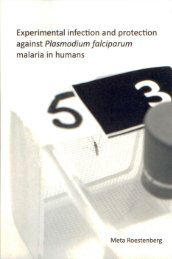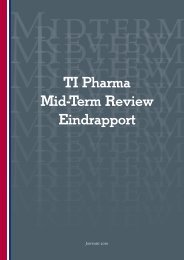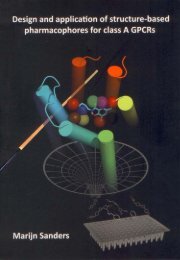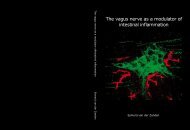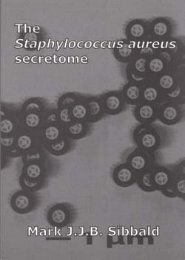Chromosome segregation errors: a double-edged sword - TI Pharma
Chromosome segregation errors: a double-edged sword - TI Pharma
Chromosome segregation errors: a double-edged sword - TI Pharma
You also want an ePaper? Increase the reach of your titles
YUMPU automatically turns print PDFs into web optimized ePapers that Google loves.
5<br />
Introduction<br />
Chromosomal instability (CIN) is a common characteristic of solid tumors that is manifested as gains or<br />
losses of whole chromosomes during cell division, leading to aneuploidy 231. This propensity of tumor cells<br />
was recognized more than 100 years ago 569, leading to the hypothesis that CIN could be a driving force in<br />
tumorigenesis 232. Indeed, several lines of evidence have since suggested a causal role for CIN in tumor<br />
formation (reviewed in 570). However, the exact cause of CIN in tumors has remained largely unknown.<br />
It has become clear that a broad range of mutations in different cellular processes can result in CIN<br />
282. Defects in mitotic checkpoint function have also been invoked as a causal event for CIN 282.<br />
The mitotic checkpoint ensures the fidelity of sister chromatid <strong>segregation</strong> over the two daughter<br />
cells by inhibiting progression to anaphase until all chromosome pairs are bi-oriented on the mitotic<br />
spindle (reviewed in 441). In various human cancers mitotic checkpoint function is compromised,<br />
and altered expression or mutations of mitotic checkpoint genes have been shown to be related to<br />
CIN and aneuploidy (reviewed in 290). Nevertheless, no evidence for checkpoint malfunctions as<br />
a direct cause of CIN in tumor cells has been found289,302,342. Moreover, the mitotic checkpoint<br />
defects that have been reported (reviewed in 282) may be well tolerated by the tumor cell<br />
population. Complete inactivation of the mitotic checkpoint, however, results in gross chromosomal<br />
mis<strong>segregation</strong> and is not compatible with cell viability292-294,393. This has led to the suggestion<br />
that inhibition of the mitotic checkpoint could have therapeutic potential in cancer treatment 290.<br />
Here, we have explored the relationship between chromosome mis<strong>segregation</strong>s and tumor cell death<br />
by using conditional depletion of the mitotic checkpoint component Mps1.<br />
Results and Discussion<br />
Efficient Mps1 depletion severely compromises viability of tumor cells.<br />
We have previously shown that absence of Mad2, BubR1 or Mps1 causes cell death within 6 cell<br />
divisions116,172,292,299. To examine the effect of conditional inactivation of Mps1 in LS174-T<br />
colon carcinoma cells, we stably introduced a doxycycline-inducible vector encoding a small<br />
hairpin RNA (shRNA) directed against human Mps1. In addition, this line stably expresses a tetrepressor,<br />
such that the addition of tetracycline or doxycycline to the culture medium induces the<br />
expression of the Mps1 shRNA and a consequent depletion of the endogenous Mps1 protein299.<br />
A clone was selected in which expression of Mps1 was reduced by more than 90% upon addition of<br />
doxycycline to the culture medium (Fig.1A). This degree of depletion of Mps1 severely compromised<br />
the viability of the LS174-T cells, since no colonies grew out in the presence of doxycycline<br />
(Fig.1A). Thus, selective inhibition of Mps1 compromises the viability of LS174-T tumor cells.<br />
Mps1 depletion inactivates the spindle checkpoint.<br />
Mps1 is an essential component of the spindle checkpoint, and its inactivation has been shown to<br />
override the cellular response to spindle poisons, such as nocodazole and taxol 142 143 . Therefore, we<br />
next tested if RNAi-mediated depletion of Mps1 in the LS174-T cells conditionally expressing the Mps1<br />
shRNA leads to functional inactivation of Mps1. To this end we cultured these cells in the presence or<br />
absence of doxycycline for a period of 3 days, and added 1 mM taxol to the culture medium for the last<br />
18 hrs. of the incubation period. Taxol stabilizes microtubules, and perturbs proper spindle assembly.<br />
This will normally lead to a mitotic delay and an accumulation of cells in mitosis that is dependent on<br />
the mitotic checkpoint. Indeed, in LS174-T cells that are grown in the absence of doxycycline we find a<br />
108




